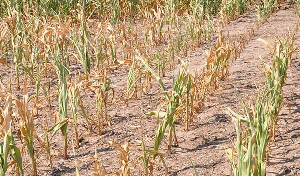GhanaWeb Feature by Bernice Owusuwaa
Understanding dry spells
According to the World Meteorological Organization (WMO), a dry spell is defined as a period of unusually low rainfall relative to the typical amount for a given region during a specific time of year.
This climatic phenomenon has recently had a severe impact on farmers in Ghana's Northern regions.
Impact of the dry spell
Farmers in the Upper East, Upper West, and Northern Regions of Ghana faced a significant dry spell during June, July, and August 2024. While other regions such as the Western, Ashanti, and Greater Accra regions enjoyed ample rainfall, the Northern regions were not as fortunate.
The lack of precipitation caused severe drought conditions, leading to withered crops and threatening the livelihoods of local farmers.
The dry spell turned fertile lands into barren fields, jeopardizing the future of agriculture in these areas.
Farmers, who depend heavily on rain-fed agriculture, found themselves facing uncertainty as their crops failed to thrive.
In response to the dire conditions, communities in Manwe and Kpongu resorted to Islamic prayers for rain. The Imams of these areas led Salaatul Istisqa, a special Islamic prayer, in hopes of alleviating the drought.
See a breakdown of areas affected by the dry spell below:
Regional reactions and concerns
In the Tamale Metropolitan, Sagnarigu, Savelugu, and Yendi Municipalities, as well as Tolon, Kumbungu, and Mion Districts, the impact was particularly harsh.
Farmers who had their fields closer to water sources were among the few to see any crops survive.
Ishaq Abass, a maize farmer in the Tamale Metropolis, expressed his concerns to GhanaWeb: "I usually plan my season in June. I grow maize, which typically takes around 90 days to harvest. By July and early August, it needs a lot of water. If the rains come too late, I’m in trouble."
Yakubu Alhassan, a farmer in Kpalsogu, Tolon District, also shared his worries: "At least one of the crops should have survived. I’ve invested all my savings in this farm, and it's turning out to be a huge loss."
Meteorological Insights
The Ghana Meteorological Agency's seasonal forecast predicted these dry spells for the Northern and Southern Sectors of Ghana from May-June-July (MJJ), June-July-August (JJA), and July-August-September (JAS) in 2024.
Read the full report below:
Government response and measures

Minister for Food and Agriculture, Bryan Acheampong
On August 26, 2024, the Minister for Food and Agriculture, Bryan Acheampong, reported at a press conference that the ongoing dry spell had caused losses estimated at GH₵3.5 billion across eight affected regions: Bono, Bono East, Oti, Northern, North East, Savannah, Upper East, and Upper West.
The drought has notably impacted crops such as maize, rice, groundnut, soybean, sorghum, millet, and yam. Acheampong highlighted that the dry spell threatens food security, given these regions contribute about 62% of Ghana’s grain supply.
To address the crisis, the government has imposed an immediate ban on the export of key grains, including maize, rice, and soybeans. This measure aims to ensure national food security during this challenging period.
Reactions from Peasant Farmers
The Peasant Farmers Association has voiced strong opposition to the government’s export ban. Bismark Owusu Nortey, President of the association, expressed dissatisfaction on Joy FM’s Top Story on August 26, 2024.
He criticized the decision for not involving farmers in the decision-making process and warned that the ban might force farmers to sell their produce at lower prices to prevent spoilage.
Nortey emphasized that while the ban aims to protect local food security, there should be accompanying measures to safeguard farmers from financial losses due to reduced market prices.
Recommendations
To mitigate the impact of dry spells, the Ghana Meteorological Agency has outlined several key recommendations:
Adopt Drought-Tolerant Crops: Prioritise the cultivation of drought-resistant and early-maturing crop varieties.
Diversify Agricultural Practices: Enhance agricultural resilience by promoting irrigation, market gardening, and mixed cropping techniques.
Select Short-Cycle Varieties: Choose crop species with shorter growth cycles that are more tolerant to water deficits.
Encourage Risk Transfer: Advocate for the use of index-based agricultural insurance to shield farmers from crop losses due to inadequate rainfall.
Establish Food Buffers: Develop and maintain food reserves to safeguard against potential shortages.
Strengthen Food Security Monitoring: Enhance surveillance and assessment of food and nutrition security in vulnerable regions.
Implement Early Warning Systems: Set up systems to provide advance warnings of prolonged dry spells to better prepare and mitigate impacts.
Adopt Climate-Smart Agriculture: Promote practices such as minimum tillage, mulching, selective pruning, and agroforestry to offset production deficits caused by dry spells.
Collaborate with Relevant Agencies: Work with the National Meteorological, Agricultural Extension, and Hydrological agencies for targeted advice and information on managing agricultural risks.
Promote Efficient Water Management: Invest in irrigation infrastructure and ensure sustainable management of water resources for agricultural use.
General News of Wednesday, 28 August 2024
Source: www.ghanaweb.com

















